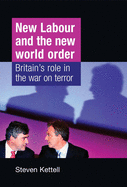On the tenth anniversary of 9/11, Steven Kettell’s account of New Labour’s role in the War on Terror offers a timely context for understanding the current machinations and idiosyncrasies of transatlantic diplomacy, says Daniel Sage.
New Labour and the New World Order: Britain’s Role in the War on Terror. Steven Kettell. Manchester University Press. April 2011.
Find this book: ![]() Google Books
Google Books ![]() Amazon
Amazon ![]() LSE Library
LSE Library

Although primarily an account of New Labour’s foreign policy, Steven Kettell tells the story amidst the backdrop of what he terms America’s “new imperialist trajectory”. For Kettell, the end of the Cold War and the emergence of the US as the world’s sole superpower shaped the underlying foundation of America’s ‘new imperialism’. Kettell likens this American hegemony to a time bomb, waiting to go off.; then, provoked by the rise in radical Islamic terrorism, it exploded in the guise of the War on Terror. This was a “strategy of global reordering” with the objective of spreading free market democracy, delivered by quick-fire military campaigns.
Amidst such developments in America, Kettell proceeds to locate the roots which ultimately tied New Labour so closely to the grand geopolitical designs of Washington. In short, Kettell argues that New Labour’s primary aim upon coming to power was to reinforce and strengthen Britain’s role in world affairs. To achieve this, Tony Blair pursued a “unifying transatlantic bridge approach” which placed Britain at the centre of “mutually reinforcing relations” between the US and Europe.
However, Kettell’s description of New Labour’s “transatlantic bridge” strategy seems inadequate in explaining why, in the long run, the New Labour governments so wholeheartedly tied Britain to the US. Kettell’s explanation is that the US – “as the centre of a unipolar world” – offered the sole means of “satisfying the desire for an active and engaged (British) foreign policy”. However, New Labour’s desire to ensure a role for Britain on the global stage does not seem a strong enough factor in explaining the profound enthusiasm with which the New Labour leadership backed the US. In particular, what seemed to be an ideological transformation – most obviously recognised in Tony Blair – with regards to the necessity of a global political reordering is not really accounted for and explained in any length. Although Kettell is meticulous in outlining the course of New Labour’s foreign policy strategy, the reasons why this course was taken remain something of a puzzle.
Nevertheless, where Kettell’s account is strongest is in his detailed and well-crafted analysis of how the War on Terror failed for all its protagonists. Not only are we reminded of the chaos wrought by the interventions in Afghanistan and Iraq, but also the full consequences for British politics and civil society are brought to bear. In particular, Kettell argues how the War on Terror acted to undermine the public’s trust in and political authority of New Labour. Committed to a “Doctrine of No Responsibility”, New Labour attempted to divorce its military endeavours from both domestic terror threats and the fracturing of social relations with Britain’s Muslim communities; a position which became increasingly untenable throughout Labour’s period in office.
Further, Kettell is exceptionally critical of the disregard shown by New Labour for the type of human rights and civil liberties which Britain was purportedly fighting to export to Afghanistan and Iraq. From collusion with the “extra-legal practices” of extraordinary rendition to the steady erosion of civil liberties in the name of “greater security”, New Labour and the New World Order outlines the scars which the war on terror left on British democratic life. All in all, Kettell paints a convincing picture of a strategy which in the name of strengthening British power, only served to undermine it. As new, great global challenges face the coalition government, it is a lesson that they might strive to learn from.
Daniel Sage is a PhD student at the University of Stirling, where he is studying welfare reform. He graduated from the LSE in 2009 with an MSc in Social Policy and Planning.
Find this book: ![]() Google Books
Google Books ![]() Amazon
Amazon ![]() LSE Library
LSE Library





